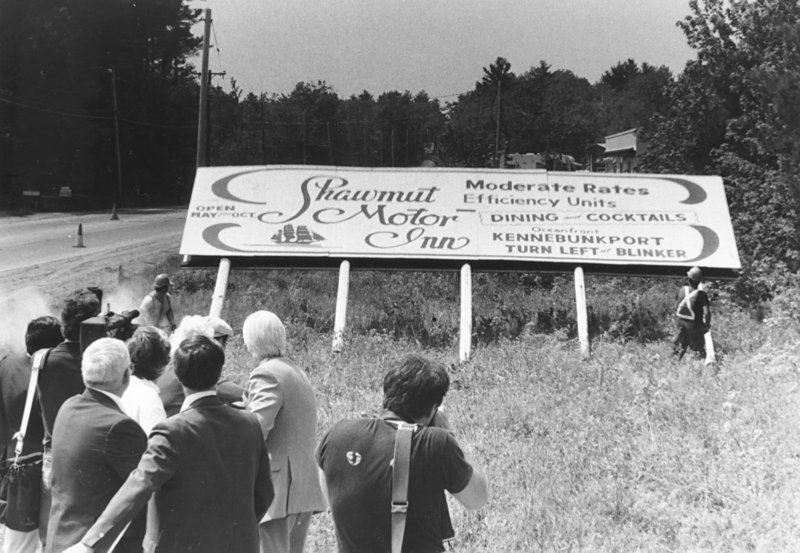AUGUSTA — Maine’s pioneering law banning highway billboards, enacted in 1977, is under siege at the State House.
Lawmakers there are lining up behind nine bills that would grant variances to state sign regulations for individual businesses and attractions.
“Everybody wants a sign,” said Senate Minority Leader Michael Thibodeau, R-Winterport, in testimony in favor of a bill that would help a snowmobile club in his town keep a sign.
But managers of Maine roads and a major environmental group say granting piecemeal changes would weaken sign laws.
The Maine Department of Transportation wants all such bills tabled, and the Legislature’s Transportation Committee already has honored that request in three instances.
On Wednesday, the committee heard separate proposals to exempt snowmobile clubs from certain regulations and to allow new signs for a historical site in Brewer and the Oxford Casino.
Peter Didisheim, advocacy director for the Natural Resources Council of Maine, said his group opposes all nine bills.
“There’s a balance that needs to be struck,” he said, “and I think existing guidelines that allow signage … for important reasons is a good balance.”
The sign proposals are local in nature and aren’t partisan.
Rep. Roger Jackson, R-Oxford, cited the casino’s “incredible economic boost” to his region as the reason why he’s asking for signs near the Gray and Auburn exits of the Maine Turnpike to direct traffic to the casino.
Rep. Joseph Brooks of Winterport, an unenrolled liberal, spoke in favor of the snowmobile request.
Rep. Richard Campbell, R-Orrington, wants the state Department of Transportation to erect signs in Brewer and on Interstate 95 and Interstate 395, between Bangor and Brewer, directing motorists to the Chamberlain Freedom Park in Brewer, a historic site honoring Maine’s Civil War-era history.
“This site is a memorial in recognition of Brewer’s legacy as a birthplace of leaders of important institutions and causes,” said Rep. Arthur Verow, D-Brewer.
But the transportation department legislative liaison, Nina Fisher, said the snowmobile club bill potentially could lead to other nonprofit groups requesting similar exemptions. The Brewer signs, she said, would not conform to federal standards.
“Without a clear policy, there is no way to say no to other signs once you say yes,” Fisher said. “Signs could eventually become meaningless.”
Dan Morin, a spokesman for the Maine Turnpike Authority, told the committee the turnpike – the stretch of road from Kittery to Augusta – already has 49 signs out of step with federal standards, including 19 that resulted from legislation.
Although the Oxford Casino meets traffic measures that could warrant road signs, Moring said it’s the turnpike authority’s policy not to erect signs for private businesses, though there are many exceptions.
Scott Smith, a spokesman for Oxford Casino, said the casino estimates it has drawn 360,000 visitors via the turnpike and around 600,000 overall.
Some on the committee seemed keen on an Oxford Casino sign.
Rep. Wayne Parry, R-Arundel, said Maine’s reputation as a vacation state warrants signs to large attractions.
“You need to get them to their location when they’re coming from out of state or from other parts of the state as quickly as you can with directional signs,” he said.
Maine was the second state in America to ban off-premises billboards in 1977, after Vermont. Alaska and Hawaii have followed suit.
On-premises signs within 1,000 feet of a business are legal but are subject to requirements, including a 25-foot height limit. Changeable signs can’t change more than every 20 minutes unless municipalities adopt a different standard.
Rep. Dennis Keschl, R-Belgrade, has proposed a bill to increase the maximum height of on-premise signs to 35 feet and maximum distance from the business to 1,500 feet. It would also allow signs to change once a minute.
Other bills this session include requests for signs pointing drivers to Lee Academy in Penobscot County, Berwick Academy in York County, Gould Academy in Bethel and other sites.
Correction: An earlier version of this story said Maine was the first state to ban billboards. It was the second, after Vermont.
Michael Shepherd can be contacted at 620-7015 or at:
mshepherd@mainetoday.com
Send questions/comments to the editors.



Comments are no longer available on this story